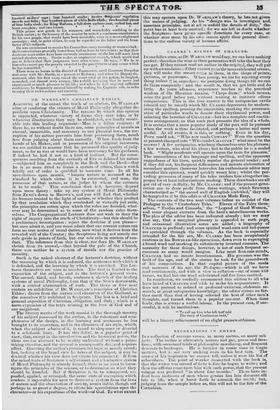R. WARDLAW'S CHRISTIA THICs.
Asseetteto at the outset the truth of re; elation, Dr.WARDLAW aims at rendering the science of Moral Philoophy altogether de- pendent upon Christianity. The reasons by which this opinion is supported, whatever variety of forms they may take, or by whatever illustrations they may be elucidated, are filially resolv- able into this leading argument—Man is a fallen creature : if there be, as without doubt there are, some principles of morals as eternal, immutable, and necessary as any physical laws, the cor- ruption of his nature prevents him from petceiving them, much less from judging about them correctly. When fresh from the hands of his Maker, and in possession of his original innocence, we are entitled to assume that be possessed this quality of judg- ment, so far as was or would have been necessary for his guidance, if indeed he had it not as a kind of instinct. But the conse- quences resulting from the curiosity of Eve so debased his nature —subjected him so completely to the flesh and the Devil—that he is no more fitted to frame a system of ethics, than a watch totally out of order is qualified to measure time. In all his speculations upon morals, "human nature is assumed as the standard by which virtue is to be estimated, and man, the possessor of that nature, as the judge by whom the estimate is to be made." This conclusion does not, however, depend upon mere theory : take up any system of Moral Philosophy from ZENO'S down to BROWN'S, and you will find that, whether its framers trusted to the light of nature, or whether they profited by that revelation which they overlooked or virtually put aside, the principles are rotten upon which the rules are founded, what- ever may be determined a3 to some of the random rules them- selves. The Congregational Lecturer does not wish to deny the right of inquiry into the truth of Christianity—but this should be a preliminary investigation : reject the doctrine if you please— but once admit it, and you must admit that our corrupt nature can form no true notion of moral duties, save what it derives from the revealed will of the Creator; the Scriptures being not merely our only guide in points of faith, but our sole rule in matters of con- duct. The inference from this is clear, nor does Dr. WARDLAW shrink front its avowal,—that beyond the pale of the Church, there can neither be a system of morals nor the practice of morality.
Such is the naked abstract of the lecturer's doctrine, without the reasoning by which it is enforced, the acuteness with which it is defended, and the learning by which it is enriched. The Lec- tures themselves are nine in number. The first is limited to the exposition of the subject, and to the lecturer's general views. The second, third, and fourth, embrace a sketch of the leading systems of moral Philosophy, from that of the Stoics downwards, with a critical examination of each. The three or four next contain an exhibition of Dr. WARDLAW'S principles of Christian Ethics; drawn from the nature and character of the Godhead, as (he conceives it?) exhibited in Sciipture. The last is a brief and general exposition of Christian obligation and duty ; which is a mere expansion of the texts relating to the love of God and of our neighbour.
The literary merits of the work consist in the thorough mastery
of' his subject possessed by the author, in the coherence and com- pleteness of the design, in the learning and acuteness he has brought to its execution, awl in the closeness of his style, which, when the subject admits of it, is raised to eloquence or diverted to a scholastic irony. It has this defect, in a popular point of view, that, except in the introduction and the historical preeis, the ideas are tuo abstract to be readily understood without a pains- taking attention, and the perusal is conserriently dry, and requires effort. Granting the author's premises, his logic is mostly sound; but, looking at the broad view, he takes of the subject, it may be doebted whether his view does not vitiate his argument. If from the naked texts of Scripture a self-evident and all-adaptive system of Moral Philosophy is already formed, there is no need to inves- tigate the principles of the science, or to determine on what they should he founded. But if Scripture is to be interpreted, ex- panded, applied, or arranged, the same state of corruption which renders it impassible for man to discover a system from the laws of nature and the observation of society, seems liable, though not perhaps in so great a degree, to vitiate his speculations upon tha character—or his expositious of the word—of God. To what extent this may operate upon Dr. W ARDLAW°S theory, he has not given the means of judging. As his "design was to investigate and. ascertain principles, not at all to unfold the details of duty," the- point has at least been omitted ; for we are left in doubt whether- the Scriptures have given specific directions for every ease, or- whether man must by his own reason apply their general three- tions to the endless variety of human affairs.






























 Previous page
Previous page